Gummo

For the sake of argument, let’s agree that catharsis can come from viewing tragedies. We watch movies circulating around slums and the darkest corners of imagination not only to get a clearer understanding of them but also because we come away feeling a little more alive and grounded in our own circumstances. But there is a unique squalor of America not found anywhere else in the world. A sort of squalor of choice or adaptation where people dwell in their own filth and close-mindedness willingly, and with perceptions that someone forced to live in such a way might not understand. So in response to this catharsis, I’ll be the first to admit that Gummo sort of hit me like a drug. Say, heroin for example. I couldn’t quite grasp what was going on, but in the trailer when I heard Madonna’s voice singing, “In the midnight hour, I can feel your power, just like a prayer, you know I’ll take you there…” over cigar-smoking, cat-torturing youth, a boy in filthy bathwater, a tornado and a happy albino woman dancing in a parking lot, I was pulled into a trial run. But since it also induces a fever-like edge of comedy, I’m going to write this review in the form of a mock prescription.
If you like to be pulled out of yourself in order to see the irony and falsehood of the pursuit of the "American Dream," Gummo might be for you. Set in the tornado-stricken city of Xenia, Ohio, it features the lives of two boys, Solomon (Jacob Reynolds) and Tummler (Nick Sutton), who spend their days killing cats to sell to butchers, riding bikes with mismatched parts, sniffing glue, having sex, and philosophizing about life in an eerie way that only a person living in this reality can. Their town is filled with strange and disturbing people who are rooted so deeply in their own bitterness, racism, and boredom that their actions can only be received as a cult-like unison of abandon and self-destruction. Chloë Sevigny plays Dot, who along with her sisters Darby and Helen, occupy themselves with a benign sense of vanity and seclusion similar to Little and Big Edie in Grey Gardens. Not exactly hard to watch, but still strange.
Continue ReadingThe Warriors

Through the eyes of movies in the 1970s, New York City looked like one rough place. I don't mean the Woody Allen romantic side of New York (Annie Hall, Manhattan). I'm talking about almost every other film made in the decade, the dark Taxi Driver side. From The Out Of Towners to Death Wish (and most cops and crime flicks), culminating in the apocalyptic Escape From New York, the place appeared to be a dangerous dump. Bottom line: Central Park is not somewhere you want to be caught in after dark. The Warriors is maybe the perfect vision of this comic book wasteland.
The gangs in New York outnumber the cops two to one, so says Cyrus, leader of the baddest (and apparently the biggest) gang in town, The Riffs. This gangsta’ visionary gets all the gangs together in Central Park for a sort of pep rally. But like so many important revolutionaries before him, he is assassinated by a creepy guy named Luther (played by the creepy actor David Patrick Kelly). Luther is able to blame the Warriors, a small-time gang in for the convention from Coney Island, Brooklyn. The Riffs kill the Warriors' leader, Cleon, and put out an APB on the rest of the gang. Suddenly every gang in town is after the remaining eight Warriors. Narrated by a hot-lips radio DJ, the Warriors are forced to fight off gangs, the cops, and negotiate New York's unreliable transportation system.
Continue ReadingOver The Edge

It's exciting knowing that once upon a time the music of Cheap Trick inspired chaos and teen violence. With the Vietnam War over and lost, Nixon out of the White House and Disco past its apex, what was left to rebel against? In the case of these pot smokin' rock'n & rollin juvenal delinquents it's the closing of the local rec center that gets their panties in a wad. Over The Edge is an amazing relic from 1979, like its East-Coast cousin from the same year, The Warriors, it perfectly captures its period and its only-in-America geography. Instead of the ethnically diverse landscape of the street gang classic this one is an all-white, pre-Spielberg suburban West Coast sprawl, when kids were either jocks or burnouts, but all could agree that school sucked, parents are hypocrites, and cops are fascists. I bet the designers of Dazed And Confused took a look at this film's style. Also it's been said that it inspired Kurt Cobain's teen rebellion opus "Smells Like Teen Spirit."
It also mark the debut for Matt Dillon who would reign over filmdom as the king of mumbling teen rebellion for the next decade. What a run he would have. He followed Over The Edge with the summer camp virginity-losing caper, Little Darlings (still not available on DVD and out of print on VHS). He then would play Moody, the ultimate high school bully, in My Bodyguard. And then he would win the James Dean wannabe sweepstakes in the SE Hinton misunderstood teen trifecta of Tex, The Outsiders, and Rumble Fish (the later two would mark the end of Francis Ford Coppola as an important filmmaker). Of course in recent years Dillon can be found mugging his way through such dribble as Herbie Fully Loaded (oh, how lucky James Dean was to die young).
Continue ReadingLBJ (The American Experience)
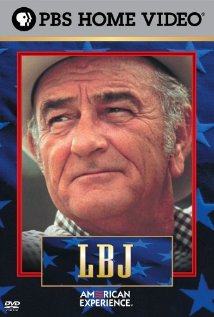 Whether it’s the Kennedys, Nixon, or FDR you can’t go wrong with any of the thoroughly epic political biographies produced by PBS for their American Experience television series. To understand the turbulent sixties no documentary gives a better overview than the exhausting, yet exuberant, Lyndon Johnson bio called, simply enough, LBJ. Johnson’s life was full of both contradictions and surprises; in the end he both represents and played a major hand in both the best and worst legacies of the decade.
Whether it’s the Kennedys, Nixon, or FDR you can’t go wrong with any of the thoroughly epic political biographies produced by PBS for their American Experience television series. To understand the turbulent sixties no documentary gives a better overview than the exhausting, yet exuberant, Lyndon Johnson bio called, simply enough, LBJ. Johnson’s life was full of both contradictions and surprises; in the end he both represents and played a major hand in both the best and worst legacies of the decade.
The film unfolds in four hour-long chapters. Episodes one and two cover a lot of ground: LBJ’s early years as the son of a Texas politician, his marriage to Ladybird, and his wins and losses in the rough world of Texas politics. He became a grand deal-making charmer first in the House of Representatives and then in the Senate. His humbling run as JFK’s vice president ended after those gunshots rang out in Dallas simultaneously throwing history a curve ball and making Johnson the president. Finishing Kennedy’s term he out-Kennedyed the Kennedys by passing loads of important legislation and was overwhelmingly reelected by the American people. And that’s when the second half kicks in, covering those disastrous last four years and beyond as his amazing social triumphs were overshadowed by the escalating war in Vietnam—a war which he inherited but naively continued to send the country deeper into.
The Psycho Legacy
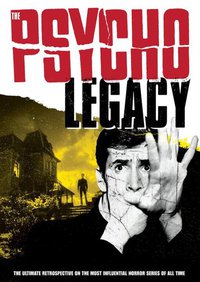 With so many books and documentaries made over the decades covering every aspect of Alfred Hitchcock’s amazing career and more specifically his masterpiece Psycho, what more can possibly be said about the subject? Director Robert V. Galluzzo manages to find a new and surprisingly fresh angle— instead of mulling over the influences on Hitchcock, we are reminded of the massive influence Psycho had. With an interesting group of talking heads, all obvious enthusiasts, they first contemplate the mythology that Psycho brought to cinema, but quickly they get to what makes the documentary most unique which is the study of the Psycho film sequels that sprung up some years later. Though not as commercially successful as many current horror film series, Galluzzo’s posse does manage to convince that they are worth a look.
With so many books and documentaries made over the decades covering every aspect of Alfred Hitchcock’s amazing career and more specifically his masterpiece Psycho, what more can possibly be said about the subject? Director Robert V. Galluzzo manages to find a new and surprisingly fresh angle— instead of mulling over the influences on Hitchcock, we are reminded of the massive influence Psycho had. With an interesting group of talking heads, all obvious enthusiasts, they first contemplate the mythology that Psycho brought to cinema, but quickly they get to what makes the documentary most unique which is the study of the Psycho film sequels that sprung up some years later. Though not as commercially successful as many current horror film series, Galluzzo’s posse does manage to convince that they are worth a look.
Though the documentary only uses quick muted clips from the films, the stills and the talking heads are engaging enough that you may not even notice. It mentions early on, briefly, that William Castle spent a decade trying to rip-off Psycho (Straight-Jacket, Homicidal, etc.), but the dozens of French thrillers and Italian horror flicks that were directly influenced by Hitchcock are ignored. Hell, if you want to talk about Psycho’s legacy (and Hitchcock’s) Brian De Palma’s had a whole career doing bad Hitchcock (until later when he discovered other genres to steal from). The Psycho Legacy also avoids Gus Van Sant’s pointless scene-for-scene remake and the short-lived Bud Court TV Series The Bates Motel. No, the Psycho legacy these guys are itching to rap about are the three “sequels.”
Exit Through the Gift Shop
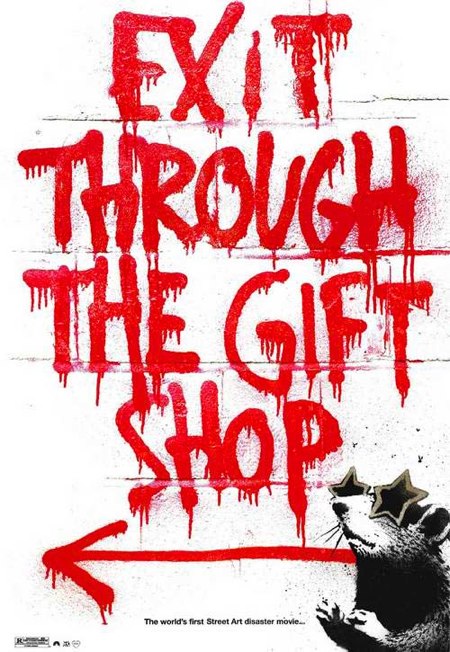 Most of the talk surrounding Exit Through the Gift Shop was regarding whether it was a hoax or all real. But what was lost in the hoopla was what an incredibly entertaining and utterly fascinating film this documentary-within-a-
Most of the talk surrounding Exit Through the Gift Shop was regarding whether it was a hoax or all real. But what was lost in the hoopla was what an incredibly entertaining and utterly fascinating film this documentary-within-a-
Part conman, part art enthusiast, Guetta is like a bloated Pepe Le Pew. He has a bunch of kids and owns a Melrose vintage clothing store, and he constantly has a camera filming every aspect of his life. While visiting France he begins filming his cousin, a famous graffiti artist known as Invader. So begins an obsession for Guetta. Back in Hollywood he hooks up with another famous artist, Shepard Fairey (who later would become famous for his Obama “Hope” posters) and then meets loads more. He goes with them and takes part in their illegal night painting activities. When the legendary Bansky (whose real identity has never been revealed) comes to town, Guetta becomes his wingman and films all of his illegal art installations. Guetta then travels with him to London and back to LA where he serves as lookout for a stunt Banksy pulls in Disneyland. Eventually Bansky gives him the assignment to finally take all that footage and edit it into a film about street art. But what he puts together, a hodgepodge of images he calls Life Remote Control, it’s a total unwatchable mess.
Hearts of Darkness

Francis Ford Coppola said of Apocalypse Now at its 1979 premiere in Cannes, “The way we made it was very much like the way the Americans were in Vietnam. We were in the jungle. There were too many of us. We had access to too much money, too much equipment. And little by little we went insane.” That madness is what you see in Hearts of Darkness, an extraordinary documentary about the film’s torturous, quixotic shoot.
With her own crew, Coppola’s wife Eleanor documented her husband’s protracted struggle to complete his epic about the Vietnam War; her footage is the basis of Fax Bahr and George Hickenlooper’s feature. She came away with an intimate picture of the feature’s near-catastrophic progress, or lack thereof. Shooting in the Phillipines, Coppola replaced a lead actor after filming began; saw helicopters on loan from Ferdinand Marcos’ army diverted to fight rebels in a real civil war; witnessed the destruction of a main set in a ruinous typhoon; and was forced to halt production when one of his key players suffered a near-fatal heart attack. And then the volatile Marlon Brando showed up, overweight and unprepared for his role as the monstrous Colonel Kurtz.
Continue ReadingFreedom Riders
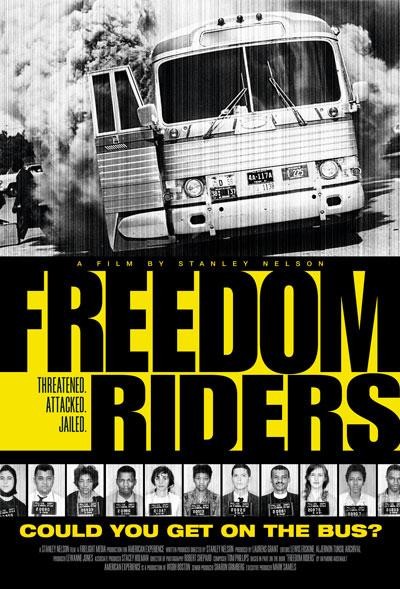 After the success of student lunch counter sit-ins, anti-segregation forces, led by a little know group called CORE (Committee of Racial Equality), decided to push the envelope in an attempt to secure their rights and bring attention to the discrimination of black Americans in the psychotically racist American South. PBS’s American Experience does it again! Freedom Riders is another historical masterpiece; with spectacular archive footage and engaging talking heads, director Stanley Nelson perfectly lays out this dangerous and complicated story. Along with the epic Eyes on the Prize, Freedom Riders is essential viewing for anyone interested in the civil rights movement or just a fascinating and entertaining slice of brutal American history.
After the success of student lunch counter sit-ins, anti-segregation forces, led by a little know group called CORE (Committee of Racial Equality), decided to push the envelope in an attempt to secure their rights and bring attention to the discrimination of black Americans in the psychotically racist American South. PBS’s American Experience does it again! Freedom Riders is another historical masterpiece; with spectacular archive footage and engaging talking heads, director Stanley Nelson perfectly lays out this dangerous and complicated story. Along with the epic Eyes on the Prize, Freedom Riders is essential viewing for anyone interested in the civil rights movement or just a fascinating and entertaining slice of brutal American history.
In a post-World War II America, blacks were experiencing new gains both economically and socially in much of the country. By the mid-50s the Supreme Court decision on Brown v. Board of Education brought a new promise for equal rights in schools, but the South was doing everything it could to stifle integration in education leading to a number of famous conflicts. In Montgomery a young pastor named Martin Luther King became an international superstar of peace leading their city’s bus boycotts. By 1960 black Southern college students took up the call first in Greensboro and then Nashville, doing lunch counter sit-ins to desegregate the powerful downtown department store restaurants. This all led to a discussion by a bi-racial Northern group called CORE to test the limits of a federal order to desegregate interstate bus travel including Southern bus station waiting rooms, cafeterias, and bathrooms that still had signs declaring “white” and “colored.” The South was not going to let the Federal Government tell them to change their culture and Kennedy’s White House had no interest in getting involved and alienating Southern white Democrats.
Tabloid
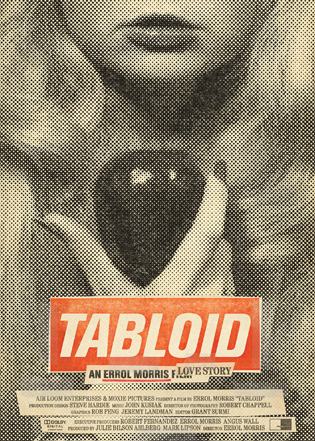 For over thirty years director Errol Morris has been redefining the visionary guidelines of what a documentary is and can be. He brought a deeper understanding of visual and sound construction techniques that pushed the documentary into a more compelling medium than the films that preceded his work. In the ‘80s, his film The Thin Blue Line helped get a guy off death row, but maybe more importantly, it brought the documentary genre into the mainstream and helped expose a lot of audience members and future filmmakers to the new possibilities that documentaries can achieve both socially and technically. Where many of the acclaimed filmmakers of his generation have lost their golden touch, every few years he keeps turning out a new film and he may of peaked with his last one, Tabloid, an insanely epic story of love and loss and the seedy nature of our voyeuristic society.
For over thirty years director Errol Morris has been redefining the visionary guidelines of what a documentary is and can be. He brought a deeper understanding of visual and sound construction techniques that pushed the documentary into a more compelling medium than the films that preceded his work. In the ‘80s, his film The Thin Blue Line helped get a guy off death row, but maybe more importantly, it brought the documentary genre into the mainstream and helped expose a lot of audience members and future filmmakers to the new possibilities that documentaries can achieve both socially and technically. Where many of the acclaimed filmmakers of his generation have lost their golden touch, every few years he keeps turning out a new film and he may of peaked with his last one, Tabloid, an insanely epic story of love and loss and the seedy nature of our voyeuristic society.
Morris, at his best, finds grand stories of people who live on the fringe of our culture with twisted obsessions, whether pet cemeteries (Gates of Heaven), holocaust denying (Mr. Death: The Rise and Fall of Fred A. Leuchter, Jr.) or mole rats and trapezes (Fast, Cheap & Out of Control). Morris has a canny ability to park his camera inside the brains of these kooks and come to understand or appreciate their causes. His best films have been his eccentric bios, also usually about a sort of obsession that eats at his subjects like Stephen Hawking (A Brief History of Time) and Robert S. McNamara (The Fog of War). Tabloid is almost an accumulation of his life’s work, combining all of what he does best and turning the dial up. It’s a bio of a former beauty queen named Joyce McKinney who sits on camera and tells her crazy and kinky story, aided by other talking heads and archive footage and a lot of press clippings. Without moralizing or taking sides, this is Morris’s most creatively laid-out spectacle, yet the quirkiness and perversion never outweigh the filmmaking.
Not Quite Hollywood: The Wild, Untold Story of Ozploitation!
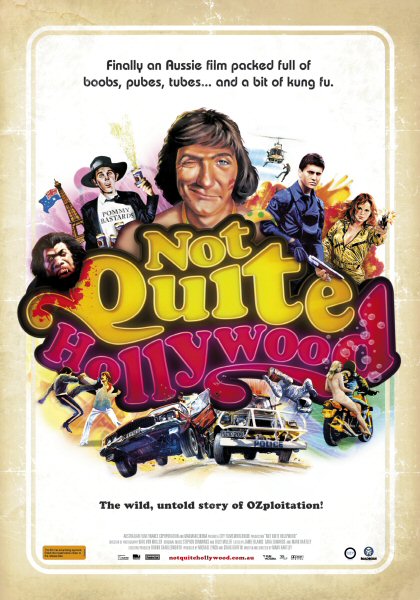 While Peter Weir and Fred Schepisi were putting Australian cinema on the map in the 1970s with films like Picnic at Hanging Rock and The Devil’s Playground, an amazing underworld of exploitation cinema was also happening Down Under full of sex and violence, exuberantly captured by director Mark Hartley in his slam bang documentary Not Quite Hollywood: The Wild, Untold Story of Ozploitation! Like his more recent ode to Filipino exploitation flicks, Machete Maidens Unleashed, Hartley has found the perfect formula for honoring the less honorable world cinema. Tracing Australia’s growth from sexploitation through stuntploitation and finally peaking with George Miller’s masterful Mad Max and Mad Max 2: The Road Warrior (known in the U.S. as The Road Warrior). With a plethora of wall-to-wall clips and both informative and entertaining talking heads telling the story including Quentin Tarantino, George Lazenby, Brian Trenchard-Smith, John Waters, and Richard Franklin, this movie is an absolute blast.
While Peter Weir and Fred Schepisi were putting Australian cinema on the map in the 1970s with films like Picnic at Hanging Rock and The Devil’s Playground, an amazing underworld of exploitation cinema was also happening Down Under full of sex and violence, exuberantly captured by director Mark Hartley in his slam bang documentary Not Quite Hollywood: The Wild, Untold Story of Ozploitation! Like his more recent ode to Filipino exploitation flicks, Machete Maidens Unleashed, Hartley has found the perfect formula for honoring the less honorable world cinema. Tracing Australia’s growth from sexploitation through stuntploitation and finally peaking with George Miller’s masterful Mad Max and Mad Max 2: The Road Warrior (known in the U.S. as The Road Warrior). With a plethora of wall-to-wall clips and both informative and entertaining talking heads telling the story including Quentin Tarantino, George Lazenby, Brian Trenchard-Smith, John Waters, and Richard Franklin, this movie is an absolute blast.
While films were filmed in and about Australia, they were usually films like Wake in Fright and Walkabout that were made by foreigners; originally Australia’s most popular film exports were soft porny sex comedies with such titles as The Naked Bunyip, Alvin Rides Again, and Again! And Again! And Again! and The Sex Therapist. While Australians were enjoying idiotic homemade comedies with the “Ocker” films (which crudely made fun of Australian hick values) like Alvin Purple, Stork, and The Adventures of Barry McKenzie (directed by Bruce Beresford who would eventually go more high brow with his Australian masterpiece Braker Morant).





